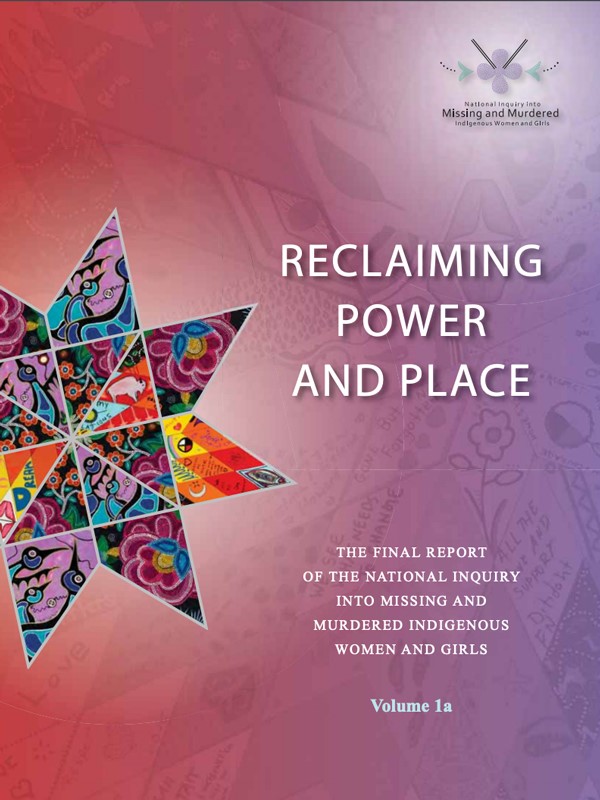Film Screening for MMIWGM2S
- Date
- February 12, 2025
- Time
- 2:00 PM EST - 3:00 PM EST
- Location
- POD-250, Podium building (380 Victoria Street)
- Open To
- Students, faculty and staff
- Contact
- Ryan Kerr ryan.kerr@torontomu.ca

Join us and other members of the TMU community for a screening of short films to honour missing and murdered Indigenous women, girls, men and two-spirit people (MMIWGM2S).
While open to all TMU students, faculty and staff, this event is catered to non-Indigenous community members to come together in the spirit of learning and respect.
This event is organized by Mercedes Massingale and Ryan Kerr alongside Indigenous Initiatives in the Office of the Vice-President, Equity and Community Inclusion (OVPECI) and the Indigenous Education Council in the Office of the Provost and Vice-President, Academic.
Event organizers would like to thank TMU Libraries for providing access to the clips.
What to expect
Mercedes Massingale (Little Shiny Wolf), who is of mixed Nisga’a and African American ancestry from Northern BC and a fourth-year student of TMU’s School of Social Work, will welcome community members and introduce the program. Guests will then watch the 35-minute film Our Sisters In Spirit: MMIWG Documentary. In the 2018 film, Indigenous filmmaker Nick Printup (Onondaga and Algonquin) interviews the loved ones of Missing and Murdered Indigenous persons, providing an informative glimpse into the lives of those affected by the ongoing genocide of Indigenous Peoples in Canada.
Mercedes will then introduce the next video clip: CBC’s Telling our Story - Rebuilding. This 15-minute excerpt outlines the impacts of Canada’s cultural genocide towards Indigenous Peoples but also offers a hopeful way forward.
After watching the material, Lisa Lafreniere, counsellor with TMU’s Student Wellbeing, will lead attendees through a grounding exercise.
Light refreshments will be provided.
Registration is required.
MMIWGM2S stands for missing and murdered Indigenous women, girls, men and two-spirit people. The families of missing and murdered Indigenous women have been raising awareness for decades.
In 2023, Statistics Canada released a report showing that Indigenous women and girls were six times more likely to be murdered than other groups of people in Canada. Between 2009 and 2021, Indigenous women and girls made up 2% and 3% of the Canadian population, yet represented 5% and 7% of homicide victims. Learn more.
In 2004, the Native Women’s Association of Canada launched the Sisters In Spirit campaign to address violence against Indigenous women and girls, creating a database of these disappearances for greater coordination and communication across communities.
Through this program, Indigenous communities and allies collectively called for a National Inquiry into Missing and Murdered Indigenous Women and Girls, which took place from 2016 to 2019.
Responding to calls for justice directed at educators
In 2019, the National Inquiry’s final report, Reclaiming Power and Place, (external link) was published, which included 231 calls for justice for governments, institutions, social service providers, industries and all Canadians. These calls, which are “legal imperatives,” can help everyone work to end the genocide of Indigenous Persons and the social systems and values that have maintained colonial violence.
At TMU, we are raising awareness about Red Dress Day and MMIWG2S in response to the calls for justice directed at educators (11.1 and 11.2).

Call to justice 11.1
All educational institutions and authorities should educate and raise awareness about missing and murdered Indigenous women, girls and 2SLGBTQQIA persons and the historical and social contexts for those experiences. All curriculum and program development must be done in partnership with Indigenous Peoples and include, but not be limited to, education on the histories, laws, practices and perspectives of Indigenous Persons.
Call to justice 11.2
All educational service providers should “develop and implement awareness and education programs for Indigenous children and youth on the issue of grooming for exploitation and sexual exploitation.”
This event is wheelchair accessible and closed captioning will be provided during the films
The university is committed to the accessibility and inclusion of persons with disabilities. If you require any additional accessibility accommodations to ensure your full participation, please email Ryan Kerr, Manager, Institutional Events, University Events and Ceremonies, at ryan.kerr@torontomu.ca.
Questions?
If you have any questions, please email Ryan Kerr, Manager, Institutional Events, University Events and Ceremonies, at ryan.kerr@torontomu.ca.

Support is available
Participating in conversations about sexual violence and gender-based violence may bring up difficult feelings. Please reach out if you need support:
- Students can access services through Consent Comes First, the Centre for Student Development and Counselling and/or the Centre for Safer Sex and Sexual Violence Support (external link) .
- Faculty and staff can connect with Workplace Wellbeing Services or access the employee assistance program for resources and counselling.
- External supports include Good2Talk (external link) , the Toronto Rape Crisis Centre (external link) , LGBT Youth Line (external link) , Trans Lifeline (external link) and Support Service for Male Survivors of Sexual Assault (external link) .
TMU community members (students, faculty and staff) who would like report an incident of sexual violence or learn about the options available are encouraged to contact Human Rights Services at humanrights@torontomu.ca or 416-979-5349.